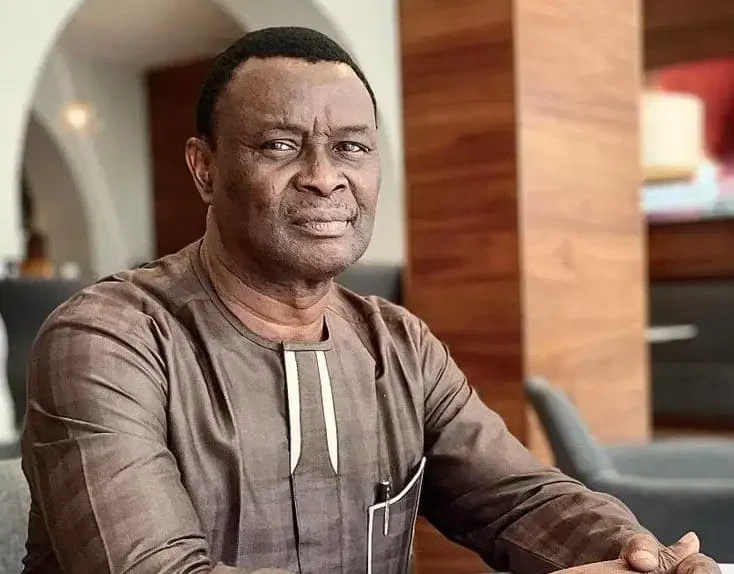• MRA knocks police over planned ‘ambush’ on three journalists today
• Mahama wants lawyers to foster social responsibility, African legal ecosystem
A human rights activist and Senior Advocate of Nigeria (SAN), Femi Falana, has urged the Nigerian Bar Association (NBA) to adopt measures to end the illegal arrest and detention of innocent citizens by the police and other law enforcement agencies in the country.
He disclosed this in Lagos at the Annual General Conference of the Nigerian Bar Association (NBA), themed: ‘Pressing Forward: A National Posture for Rebuilding Nigeria’.
He tasked lawyers with using the event to establish a comprehensive mechanism for implementing the Administration of Police Establishment Act and Criminal Justice Act, which all 36 states have adopted.
Both laws have abolished the arrest and detention of citizens for civil wrongs and breach of contract and made provisions for legal representation of suspects in police stations, conditional or unconditional bail, and humane treatment of suspects.
However, Falana lamented that the police and other law enforcement agencies have continued to breach suspects’ fundamental rights to personal liberty, dignity, and fair hearing.
He said: “The NBA should direct the members of the Human Rights Committee of the 128 branches to accompany Chief Magistrates during the monthly visits to all police stations in the country. Such visits will end the incessant arrest and detention of suspects and other people as the magistrates are empowered to grant bail to suspects, order the release of suspects, or direct suspects to be arraigned in appropriate courts.
“Let the NBA leadership pressurise the Chief Judge of the Federal High Court to designate judges to conduct monthly visits to the detention facilities of the Armed Forces, Economic and Financial Crimes Commission (EFCC), Independent Corrupt Practices and Other Related Offences Commission (ICPC), National Drug Law Enforcement Agency (NDLEA), Department of State Services in line with the provisions of Section 34 of the Administration of Criminal Justice Act and Section 70 of the Police Establishment Act.”
Falana charged lawyers to apply the provisions of the Anti-Torture Act 2017 to end the torture of suspects and other people in Nigeria. According to him, “Let the police and other law enforcement officers be made to know that the penalty for subjecting suspects to torture is 25 years imprisonment without any option of fine and that officers who torture suspects to death are liable to be tried for murder. In addition to the prosecution of torturers, the victims of torture are entitled to sue for monetary compensation.”
He called on the state Attorneys General to ensure that legal practitioners prosecute criminal offences in all courts in accordance with Section 106 of the Administration of Criminal Justice Act and the relevant provisions of the Administration of Criminal Justice Laws applicable in the states.
He said other states should emulate Delta and Kano, which have cancelled the prosecution of criminal cases by police officers who are not legal practitioners.
The Senior Advocate further urged the lawyers to provide pro bono legal services to indigent citizens with genuine complaints.
“Instead of rejecting the complaints of indigent citizens on account of impecuniosity, lawyers should refer them to the offices of the Legal Aid Council, National Human Rights Commission and the Public Defender in each state of the federation,” Falana added.
THIS came as the Media Rights Agenda (MRA) condemned the persistent harassment and intimidation of journalists.
It said recent incidents of abductions, arbitrary arrests, detentions, and other forms of attacks against media professionals by security and law enforcement agencies have reached alarming levels and pose a grave danger to media freedom and democracy in Nigeria.
The MRA disclosed the recent cases involving Managing Editor Ayomide Eweje, former reporter Wisdom Okezie, and Publisher Oluwamodupe Akinola.
The Nigeria Police have requested that they report to the office of the Assistant Inspector-General (AIG) of Police, Zone 2 Command in Onikan, Lagos, today, August 27, 2024, to assist with an undisclosed investigation.
The three individuals received separate letters dated August 22, 2024. The letters were signed by Deputy Commissioner of Police Martin Nwogoh on behalf of the AIG in charge of Zone 2 headquarters of the Nigeria Police. The letters stated that the office was investigating a reported matter. However, they did not specify who reported the matter or what information was required from the recipients to help them prepare adequately.
The deputy police commissioner asked Eweje, Okezie and Akinola to report to the officer in charge of the Zonal Monitoring Unit, stressing that “this is a fact-finding exercise in the interest of justice and fairness.”
In a statement in Lagos by the Head of its Legal Department, Obioma Okonkwo, MRA said the police’s failure to provide details in the invitation letter was an ambush.
It added that it had identified a pattern in numerous such invitations by the police designed to lure journalists to the police station only to detain them when they report in response to the supposed invitation.
It said it was curious that the police had become the weapon of choice for public officials and other wealthy or powerful individuals seeking to silence and punish journalists who publish adverse reports about them.
“It seems the police now consider journalism a crime such that anybody unhappy about any report published by the media can get the police to hunt down any journalist involved with uncommon zeal even as real criminals go about their business unchallenged for the most part.”
Okonkwo stated that the police often claim to be investigating complaints as a reason for summoning journalists, detaining them, or taking them to court. However, they don’t investigate to verify the truth of the stories or articles published by journalists that led to the complaints against them.
She called on the Inspector General of Police (IGP), Kayode Egbetokun, to implement measures to stop the apparent abuse of police powers, noting that the consistent failure to check this practice in the past had created a climate of impunity.
She added that most police officers now feel confident that there will be no negative consequences for them, which has, in turn, encouraged many and resulted in an upsurge of unjustifiable harassment of journalists.
MEANWHILE, speaking on ‘Africa’s Future Amid Rising Security, Economic and Political Challenges’ at the NBA conference, former President of Ghana, John Mahama, said the rise of civil unrest reflects profound disillusionment with the democratic process, stressing that the responsibility to strengthen the pillars of democracy, rule of law, preserve powers, and the protection of fundamental human rights lies within the profession.
He urged lawyers to draft legislations that balance economic development with environmental sustainability, ensuring that the Africa of tomorrow is not constructed at the expense of its natural heritage.
“You must critically examine our constitutional frameworks, electoral processes and accountability mechanisms. The NBA must be at the forefront of advocating for reforms that enhance the credibility of our democratic institutions and restore trust in the social contract between the governed and their leaders,” he said.
He explained that the legal profession plays a crucial role in promoting transparency and accountability in governance, and reforms of the legal education systems are needed to produce lawyers who are not only technically proficient but also deeply committed to social responsibility.
Speaking on the African Continental Free Trade Area (AfCFTA), he noted that the initiative is not just an economic necessity but a realisation of the Pan-African dream. He stated that lawyers must advocate for and implement legal mechanisms enabling the free movement of people and goods across borders while addressing legitimate security concerns.
Lawyers were tasked with tirelessly working to harmonise immigration laws, recognise professional qualifications across member states, and establish robust systems for the mutual recognition of judgments and arbitral awards, as implementing AfCFTA provides varying opportunities for their profession.
“For your profession, implementing AfCFTA opens up new opportunities and responsibilities. You must proactively adapt your legal education and practice to meet the needs of an integrated African market. This involves developing agencies in international trade law, cross-border districts, and comparative African law. It also means establishing Pan-African law firms and legal networks capable of serving clients in various countries across the continent, thereby fostering a truly African legal ecosystem,” he said.
Senate President of Nigeria, Godswill Akpabio, emphasised that the National Assembly is not just a legislative body but must also serve as a critical institution in the democratic process, ensuring checks and balances within the government.
He stated that they are currently drafting legislation to address the welfare of non-judicial workers, who play a crucial role in the success of the judicial system.
He also urged lawyers to remember that their strength lies in their numbers and unified purpose for a renewed mindset, adding that they have the potential to transform Nigeria and the entire continent.
Akpabio noted that the NBA played a pivotal role in shaping the legal and political landscape that facilitated Nigeria’s path to independence in 1960.
“Let us remember that yesterday’s mindset took us to where we are today and today’s mindset will definitely take us to where we will be tomorrow. To embody our theme and reshape our nation, we must change our thinking, attitudes, and the total paradigm shift. We must transform our minds,” Akpabio said.
For his part, the Attorney General of the Federation, Lateef Fagbemi (SAN), stated that he would establish a working group to review the federation’s laws.

 2 months ago
66
2 months ago
66















 English (US) ·
English (US) ·